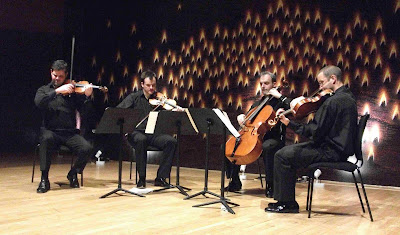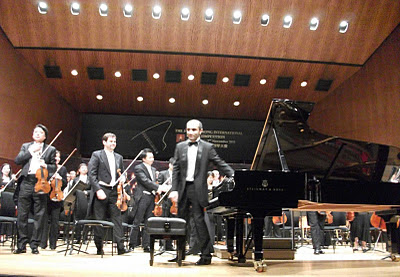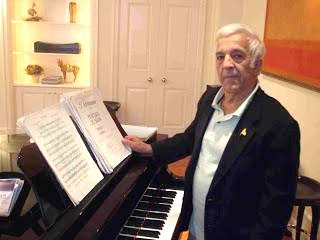Here we continue our interview...
 |
| A star-studded piano competition jury. See how many names you can identify. |
Could you briefly relate to us the Herculian tasks of running a
competition?
Running
a competition is indeed a very demanding job which is made easier when we can
count on an exceptional panel of Jury members (above), and by having strong commitment
to make Hong Kong a centre of excellence in the musical world. We have one of
the best competitions in the world despite having a run of just three editions.
The 4th Hong Kong International Piano Competition will take place in
October 2014. The trust deposited in us by the sponsors is a source of strength
for us, given that running a competition is a very expensive proposition.
It
is true that many times one feels that pushing the Competition through is simply
the result of sheer force of will nurtured by the belief in what we are
pursuing, and what we are trying to achieve. It is a great performance by
everybody involved.
 |
| An informal pose by the three 1st Prizewinners of the Hong Kong International Piano Competition: (From left) Giuseppe Andaloro (2011), Ilya Rashkovskiy (2005) and Jinsang Lee (2008). |
There have been three
competitions so far, bringing to the fore wonderful pianistic talents such as
Ilya Rashkovskiy, Jinsang Lee and Giuseppe Andaloro. They are also being
promoted in the annual The Joy of Music Festival held each October in Hong Kong. How do you see their careers developing
post-competition?
The
career of a performing artist is definitely not an easy one. There are so many
new artists continuously arriving into the performing arena. To be able to say
who will succeed in this very competitive world is extremely difficult. Many
times, it is not only a matter of being specially gifted (essential for an
artist) but also a matter of being well taught and having the opportunities to
be invited to perform around the world. There are many pressures exerted on
these budding artists to which, justly or unjustly, many will succumb.
Winning
a competition gives the artists a card of credibility, a card that is being
signed (and backed up) by a group of exceptional musicians (the members of the
Jury), and this is of great help to the artists who hope to perform in front of
audiences around the world. Of course, it is the approval of the audiences
which is, in the long term, going to determine whether an artist is going to
survive or not as a performer.
The Joy of Music Festival essentially sees three separate lines of
musical activities – the Winners Series of piano recitals, the Highly
Recommended Series of concerts, and the Master Teacher Series of masterclasses
– coalesced into one event-packed week. How lucky Hong Kong is to have such
dedication to music and culture!
Organising
a music festival creates the opportunity for several artists to be in Hong Kong at the same time. They not only give solo performances, but also perform
together, in different combinations of chamber music. Many of the artists get
to know each other during the Festival and they develop friendships that can
greatly help them in what is essentially a very lonely profession. It would be
very difficult and expensive to achieve that if we were to invite artists
separately at different times of the year. A festival also creates a different
atmosphere, a different attraction for the audiences.
 |
| A friendly breakfast meeting held at Tom Lee (Megabox) with Gary Graffman and Malaysian child prodigy pianist Tengku Irfan in attendance. |
You also have those Breakfast Meetings with illustrious guest speakers
and much intellectual discourse. This has evolved to become the series of talks
about music by the eminent writer and broadcaster Jeremy Siepmann. How do you
intend to develop this thread further?
We
have invited Jeremy Siepmann (below) to be a regular fixture in The Joy of Music
Festivals. He is an artist with a vast knowledge of music in the broadest sense
of the word. His enormous experience is in communicating the essence of music
to make its component parts comprehensible, and then reconstructing these parts
so that the wider picture of music becomes greater than the sum of its parts. When
listening to music under his guidance, one feels something “clicking together”,
which otherwise would have been missed altogether. Make no mistake, he does not
teach you to like or dislike a piece of music or the way it is performed.
Instead he helps you to understand, to sharpen your senses, to be more aware, when
you listen to a piece of music being performed. One does not need to know music
to enjoy a performance or listening to a recording, but one can definitely
learn to listen to music differently, with new ears.
 |
| When Jeremy Siepmann speaks, people listen. |
One would imagine that sponsorship plays a massive part in order for
the Competition, Festival and other activities to take place. How does the
Society undertake and manage its fundraising?
We
depend completely on our sponsors to present our activities. As I said before,
the trust deposited on the Chopin Society of Hong Kong to present events of a
very high cultural and educational value, have contributed to making Hong Kong
a centre of artistic excellence in Asia and the world.
You are busy with work as the honorary consul of Uruguay in Hong Kong and Macao, while Andrew travels the world as investment
advisor for BNP Paribas Wealth Management. How do the both of you find time for
the Society and everything else?
Hong Kong is a place where YOU CAN. Of course, this does not come easily but
somehow, efforts are, in general, rewarded. This is an enormous incentive when
you set your sights to try to achieve something big. Having lived in places
which I refer to as “You Cannot” places, it is a great relief to be part of a
society which trusts that efforts are rewarded, and one is able to push forward
to achieve whatever goals one sets to achieve. Once you believe in something,
just grab that belief very tightly and run. You will be amazed to realise how
much you are able to stand and to push. Sometimes you cannot get it, but you
feel you want to try, and you feel prouder to have tried.
 |
| Hong Kong presents to the world three top pianists from Korea, Russian and Italy. |
What does the future hold for the Chopin Society of Hong Kong?
We
hope the Chopin Society of Hong Kong will be a source of pride for the citizens
of Hong Kong and a source of friendship, inspiration and help for
all artists no matter where they come from.

















































